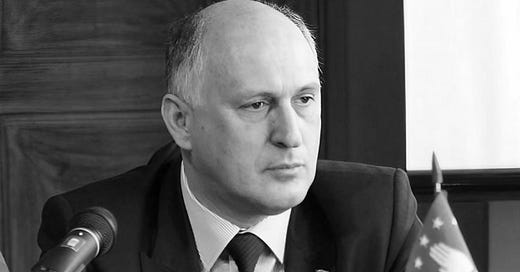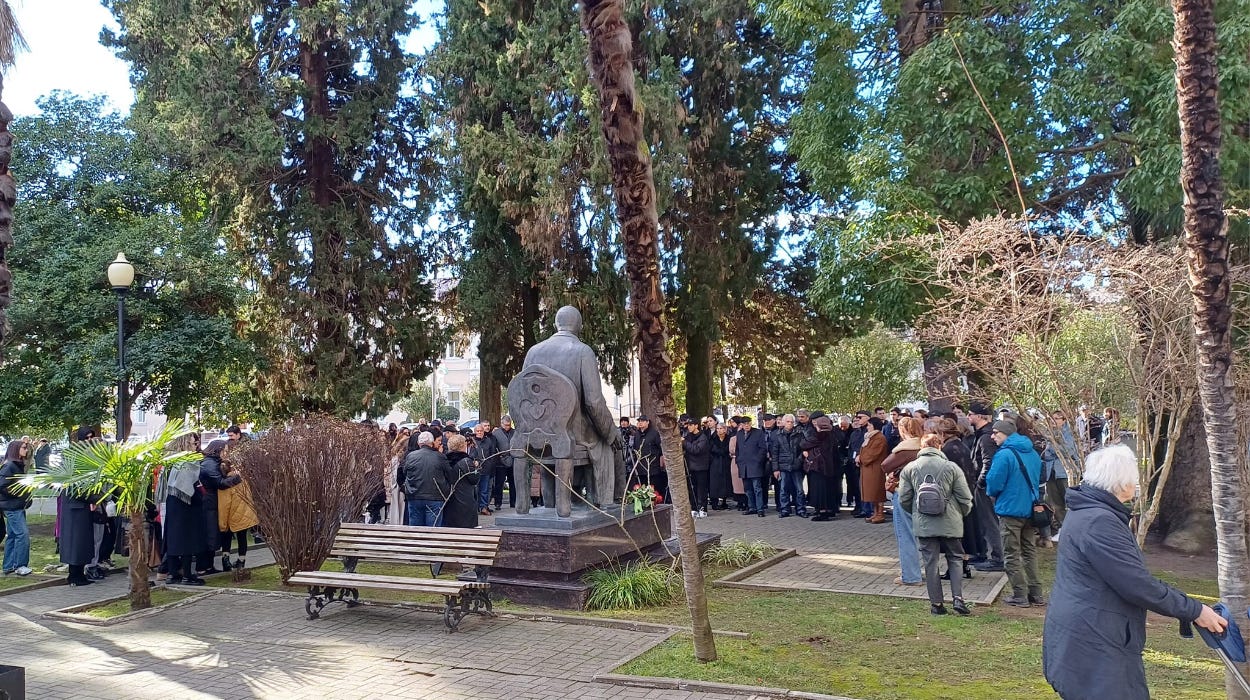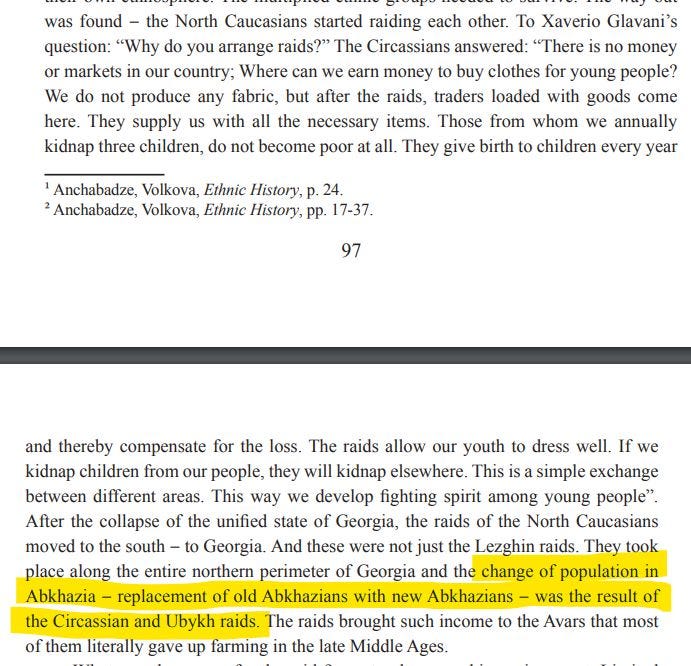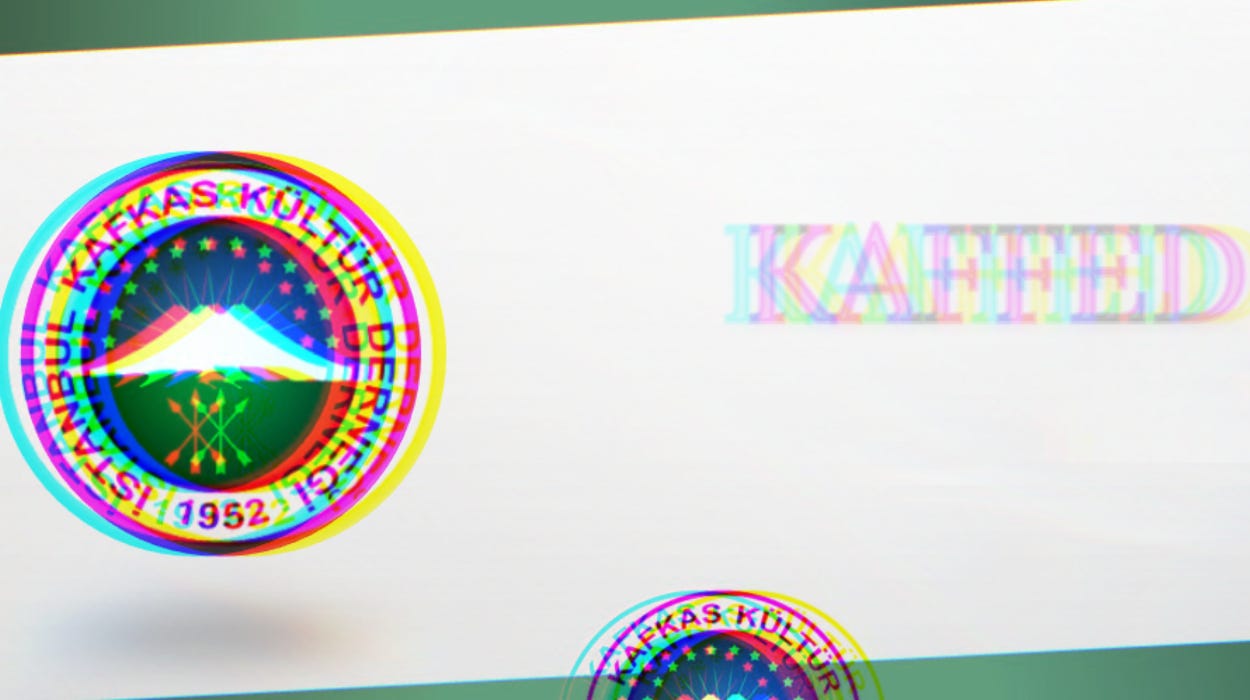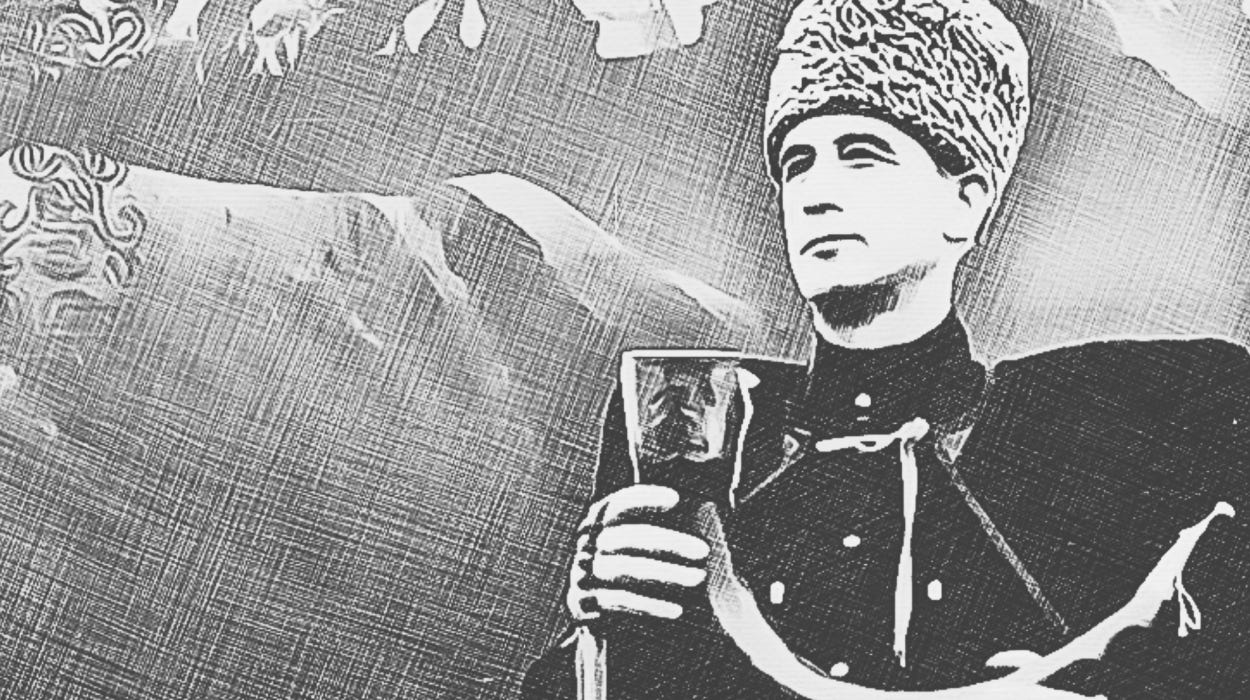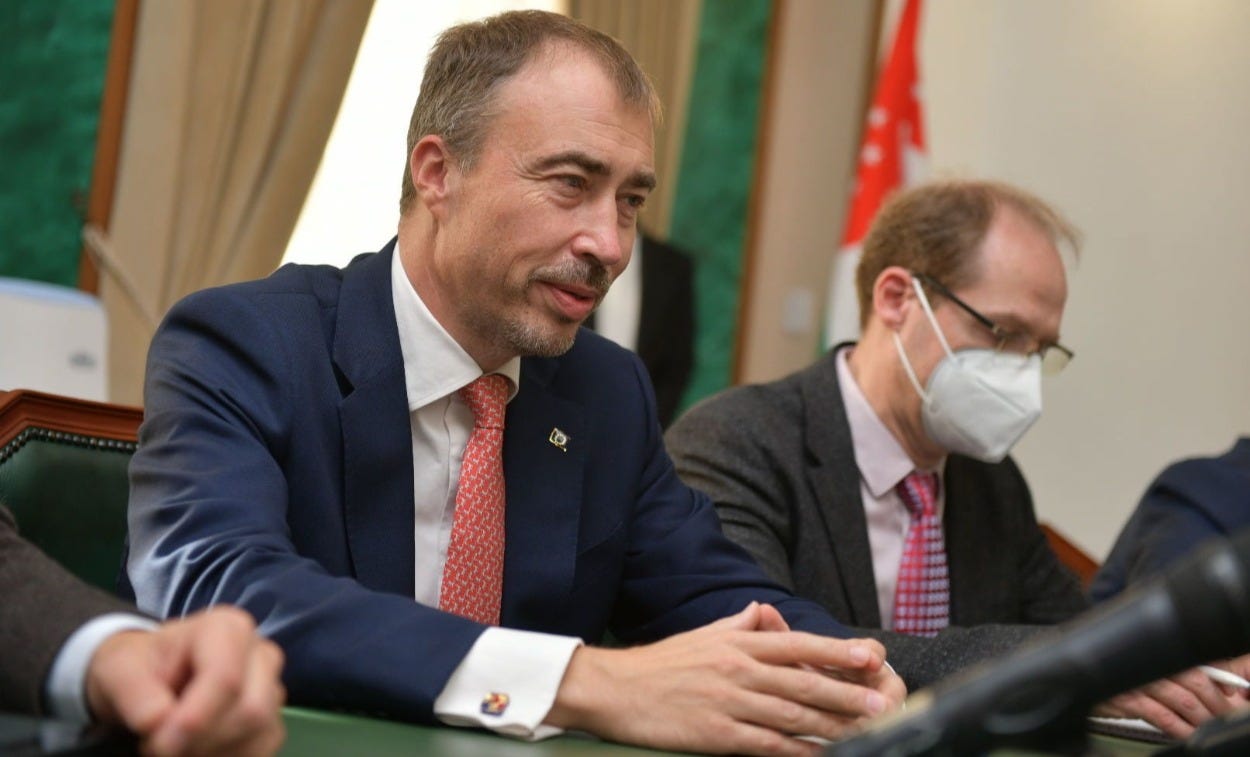Viacheslav Chirikba: "I repeatedly urged the authorities, but nothing was done"
In a poignant interview with Abaza-TV, Viacheslav Chirikba, the head of the Center for Strategic Research at the President of the Republic of Abkhazia, expressed his profound dismay over the incident.
SUKHUM / AQW'A — More than 200 works were saved from the fire in the Central Exhibition Hall of the Union of Artists of Abkhazia, where the entire collection of the National Art Gallery is stored. However, artists and experts say that the most valuable pieces were lost. Among the significant losses is the entire collection of paintings by the first professional Abkhazian artist Alexander Shervashidze-Chachba, a grievous blow to the nation's artistic legacy.
In a poignant interview with Abaza-TV, Viacheslav Chirikba, the head of the Center for Strategic Research at the President of the Republic of Abkhazia, expressed his profound dismay over the incident.
"Last year, I repeatedly urged the republic's authorities to move Alexander Shervashidze-Chachba's works from the "storage" to a safer place, suggesting the creation of a separate museum for the artist. There was a fire in the "storage" in 2014, but it was contained. I warned that next time we might not be so lucky, and we could lose our treasure, as a fire in the storage was only a matter of time. But nothing was done. A few months ago, sensing something might happen, I approached the authorities in Sukhum, urgently requesting to find a location for the safe storage of the works of the world-famous artist. Again, nothing came of it! Thus, we lost the chance to save our treasure."
Abkhazia Mourns Historic Art Loss at Sukhum Memorial Event
SUKHUM / AQW'A — In a sombre event marking a significant cultural tragedy, a mourning rally was held in Abkhazia following the devastating fire at the Central Exhibition Hall of the Union of Artists of Abkhazia. The fire, which occurred overnight, almost completely destroyed the National Art Gallery's entire collection housed on the second floor, including more than 300 works by the renowned Abkhazian artist Alexander Chachba-Shervashidze.
The rally, which took place in Sukhum Square, in front of the State Museum at the monument of Alexander Chachba-Shervashidze, mourned the irrevocable loss of a substantial part of the nation's cultural heritage. Cultural figures and community representatives from Abkhazia began the event by laying flowers at the grave of Alexander Chachba-Shervashidze, whose works formed a significant portion of the lost collection.
Acting Minister of Culture Dinara Smyr reported a catastrophic loss of over 4,000 art pieces, including more than 300 works by the renowned artist Alexander Chachba-Shervashidze, a towering figure in Abkhazian art. This incident not only signifies a massive material loss but also represents a profound cultural void for the Abkhaz people.
Alexander Chachba-Shervashidze passed away at the age of 101 in Monaco and was initially buried in Nice, France. In 1985, the artist's remains were reinterred in Abkhazia. In a 1958 letter to his daughter, the artist wrote, "Despite being left without means of subsistence, I am sending all my works to my homeland…"
“For history is the raw material for nationalist or ethnic or fundamentalist ideologies, as poppies are the raw material for heroin addiction. The past is an essential element, perhaps the essential element, in these ideologies. If there is no suitable past, it can always be invented.”
— Eric Hobsbawm, (co-edited with Terence Ranger) "The Invention of Tradition" Cambridge University Press, 2012
In the 21st century, an excerpt from the Georgian academic dumpster.
'Chronos', Journal of the Ivane Javakhishvili Institute of History and Ethnology. No: 4 Tbilisi, 2023 pp.97-98
'On the Ethnic and Cultural Diversity of the Caucasus' by Prof.(!) Roland Topchishvili
Istanbul Caucasian Association Suspends Relations with KAFFED
ISTANBUL ― The Istanbul Caucasian Association (İstanbul Kafkas Kültür Derneği - İKKD) has announced the suspension of its relations with the Federation of the Caucasian Associations (KAFFED), signaling a significant shift within the Circassian community in Türkiye. This move follows the recent withdrawal of the Kayseri Caucasian Association from KAFFED, stirring debates about a potential domino effect among other member associations.
In a detailed statement released on X (Twitter), İKKD outlined the deliberations that led to this decision. The statement highlighted discussions held on January 18, focusing on "Current problems, KAFFED relations, and expectations," attended by former presidents, KAFFED delegates, members of the Youth Commission, and the management board.
The statement noted, "It has been observed that there is a serious loss of motivation in relations with the federation, stemming from recent developments. This has been shared with participants, including reasons and processes." It further emphasised concerns about the perceived antidemocratic functioning within KAFFED and the fragility caused by the current constitution, leading to a loss of motivation and future anxieties.
Abkhazia's New Caves and the Journey of Naming
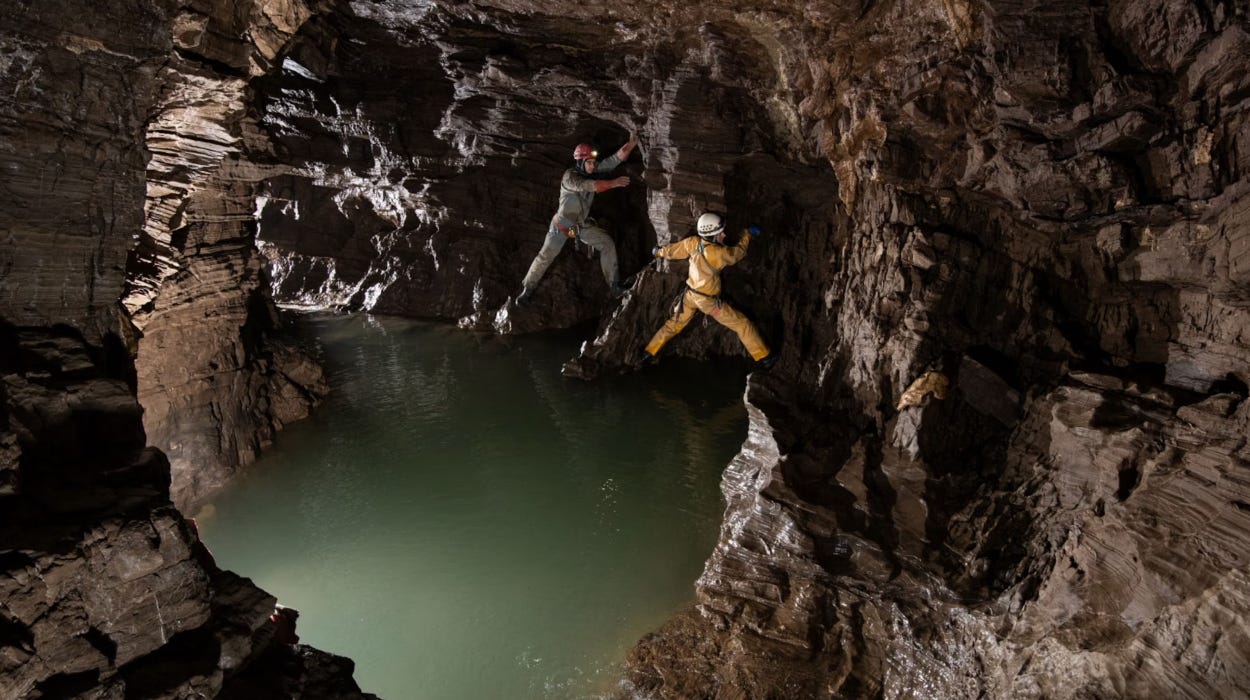
The small, yet geographically diverse region of Abkhazia has recently gained attention in the speleological community due to new discoveries in its cave systems. Notably, Abkhazia is already recognised for having caves that rank in the first four lines of the world's deepest explored and studied caves, all located in the Arabika Massif. This list includes the Veryovkina Cave, with a depth of 2223 metres, and the Krubera-Voronya Cave, at 2199 metres, Sarma cave at 2199 metres and Snezhnaya cave at at 1340 metres.
The latest exploration efforts by Crimean speleologists have uncovered 15 new caves, both large and small, in areas previously unexplored. This development adds a new chapter to Abkhazia's rich speleological history and prompts a significant cultural discussion regarding the naming of these natural wonders.
Saveliy Chitanava, the Chairman of the State Committee for Ecology of Abkhazia, shared insights into the collaborative efforts and challenges faced in this domain. "We have established a long-standing relationship with Russian speleologists, quite fruitful. They apply to us for a certain period for conducting expeditions. They must receive permission from the State Committee for Ecology of the Republic of Abkhazia in agreement with the Ministry of Tourism. Without this permission, it is forbidden to descend into the caves independently," he explained. This statement highlights the structured and respectful approach to exploring these natural wonders.
The 13th Anniversary of the Assassination of Circassian Opinion Leader Tsipine Aslan
JINEPS — The Circassian national movement gained significant momentum following the Soviet Union's collapse in 1991. During Boris Yeltsin's presidency, the more democratic environment compared to today's Russia enabled the Circassian community to establish various institutions and bring forward leaders capable of guiding the national movement. In such a context, Tsipine Aslan emerged as a prominent voice throughout Circassia.
Aslan's life tragically ended due to an unresolved assassination on December 29, 2010. Shebzuko Astemir, a journalist in Nalchik and director of the Djarez Circassian Language Club, reflected on Aslan's significance to the Circassian people and the impact of his assassination in an interview with Jineps.
"If history ever witnesses a 'Circassian Renaissance', it will be associated with his name."
Aslan Tsipine is a legendary figure in modern Circassian history. He was not only a renowned scientist and folklorist but also a champion of traditional Circassian culture, an accomplished beekeeper, journalist, and a respected figure. His legacy is diverse and influential. Regrettably, I never had the opportunity to meet him personally. However, his works clearly indicate his dedication to revitalising Circassian national identity by revitalising its spiritual and material culture. Aslan was a masterful orator, captivating people with his eloquence. His speeches, both in Adyghe and Russian, were remarkably literate. His profound influence on the Circassian people was notable for its breadth. He was a figure of undisputed authority. Years after his passing, no one has yet emerged to fill his void. I am confident that Tsipine Aslan will be remembered as a national figure in Circassian history. If our nation successfully reforms and history records a “Circassian Renaissance”, it will undoubtedly be linked to his legacy.
Toivo Klaar: "Abkhazia’s openness should not become a casualty of Russia’s war against Ukraine"
“The EU has been facilitating or funding a considerable number of humanitarian programmes in Abkhazia over more than a decade. Despite disagreements on some core issues, there always was possible to keep channels of communication open. It’ll be highly regrettable if it disappears now.” “Abkhazia’s openness should not become a casualty of Russia’s war against Ukraine.“
The personal statement by the European Union Special Representative for the South Caucasus and the Crisis in Georgia Toivo Klaar can be read at https://jam-news.net/abkhazia-eu-relations-toivo-klaar-abkhazia-should-not-become-a-casualty-of-russias-war-against-ukraine

